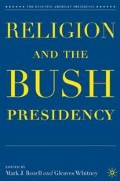Abstract
The Republican and Democratic parties are in pitched battle for supremacy in American politics. Their efforts have taken on heightened significance in recent years as national elections have become more closely contested, forcing both parties to seek additional ways to attract new supporters. Over time, a political maxim has developed: Democrats must do a better job with evangelical voters to win national elections, and Republicans must win more minority votes to maintain their recent success. This maxim has driven both parties to court voters that they have traditionally conceded to the opposition. The Republican Party has a particularly difficult task as it relates to African Americans, a segment of the electorate with which it has had very limited electoral support. And despite the Grand Old Party’s (GOP) recent electoral successes and contemporary dominance, they may actually have a more difficult task ahead in overcoming its inability to win black votes.
Access this chapter
Tax calculation will be finalised at checkout
Purchases are for personal use only
Preview
Unable to display preview. Download preview PDF.
Notes
Herbert Aptheker, ed., A Documentary History of the Negro People in the United States (New York: Citadel Press, 1969); and
Benjamin Quarles Black Abolitionists (New York: Oxford University Press, 1969), quoted in
Hanes Walton, Black Republicans: The Politics of the Black and Tans (Metuchen, NJ: Scarecrow Press, 1975), 15.
Vincent P. De Santis, “The Republican Party and the Southern Negro, 1877–1897,” Journal of Negro History, 15, no. 2 (April 1960): 73.
The premier study of this period was written by Hanes Walton, Black Republicans: The Politics of the Blacks and Tans ( Metuchen, NJ: Scarecrow Press, 1975 ).
Louis Gould, Grand Old Party: A History of the Republicans (New York: Random House, 2003), 489.
R. W. Apple, Jr., “Courting of Voting Bloc Poses Question of Motive,” New York Times, August 2, 2000.
David Masci, “Religion and Politics,” CQ Researcher, July 30, 2004, 639.
Dean Kotlowski, Nixon’s Civil Rights: Politics, Principle, and Policy ( Cambridge, MA: Harvard University Press, 2001 ), 128.
Diana Jean Schemo, “Graduation Study Suggests That Some States Sharply Understate High School Dropout Rates,” New York Times, September 17, 2003.
Daria Hall, “Getting Honest about Grad Rates: How States Play the Numbers and Students Lose,” Education Trust, June 2005; and
Michael Dobbs, “States’ Graduation Data Criticized: Independent Study Shows Disparities,” Washington Post, June 24, 2005.
Christopher Swanson, “Who Graduates? Who Doesn’t? A Statistical Portrait of Public High School Graduation, Class of 2001,” Urban Institute, February 2004.
William Julius Wilson, When Work Disappears (New York: Vintage Books, 1996), xiii.
Julie Mason, “Bush Turns Up Heat in Effort to Win Over Black Voters,” Houston Chronicle, March 3, 2001, 1.
See, John Pitney, “Frames, Wedges, Magnets, and Silver Bullets: Republican Strategies,” in American Political Parties and Constitutional Politics, ed. Peter Schram and Bradford Wilson (Lanham: Rowman and Littlefield, 1993).
John J. Dilulio, Jr., Speech before the National Association of Evangelicals, Dallas, TX, Wednesday, March 7, 2001, citing data from George Gallup, Jr., “Religion in America: Will the Vitality of Churches Be the Surprise of the Next Century,” Public Perspective (October–November 1995): 4. See also
George Gallup and D. Michael Lindsay, Surveying the Religious Landscape: Trends in U.S. Beliefs (Harrisburg, PA: Morehouse Publishing, 1999).
Editor information
Editors and Affiliations
Copyright information
© 2007 Mark J. Rozell and Gleaves Whitney
About this chapter
Cite this chapter
Fauntroy, M.K. (2007). Buying Black Votes? The GOP’s Faith-Based Initiative. In: Rozell, M.J., Whitney, G. (eds) Religion and the Bush Presidency. The Evolving American Presidency Series. Palgrave Macmillan, New York. https://doi.org/10.1057/9780230607354_9
Download citation
DOI: https://doi.org/10.1057/9780230607354_9
Publisher Name: Palgrave Macmillan, New York
Print ISBN: 978-1-349-53870-6
Online ISBN: 978-0-230-60735-4
eBook Packages: Palgrave Political & Intern. Studies CollectionPolitical Science and International Studies (R0)

